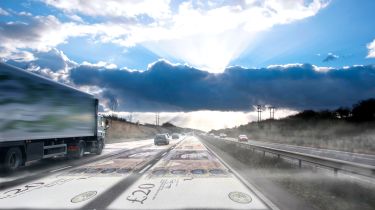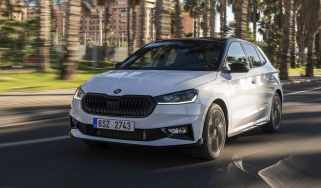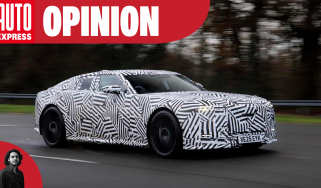UK road pricing plans: MPs slam Treasury for lack of engagement with report
Government risks losing out on tens of billions of pounds in tax revenue if it does not consider plans to replace fuel duty with road pricing...

The Transport Committee has criticised the Treasury for failing to engage with its recommendations on road pricing.
The cross-party group of MPs published a comprehensive report on road pricing back in February 2022, recommending that the Government consider a ‘pay-as-you-go’ road pricing system to replace the black hole that will be left in the Treasury’s coffers as more drivers move to EVs and fuel duty revenue decreases.
More than a year on, however, the chair of the committee – Conservative MP Iain Stewart – has expressed disappointment at the Treasury. In a letter to the chancellor, Jeremy Hunt, Stewart wrote: “It is discourteous both to my committee and to the witnesses who freely gave their time and expertise, both in writing and in person, that your department has not meaningfully engaged with the substance of our report nor responded to the specific conclusions and recommendations made.”
James Cartlidge MP, a minister in the Treasury, replied to Stewart, writing: “As set out in the chancellor’s previous letter, the Government does not currently have plans to consider road pricing. Given this, the Government does not have further views on the committee’s recommendations for the ways in which road pricing should be considered.”
Stewart highlighted that the lack of a plan to consider road pricing means the Treasury risks losing tens of billions of pounds in tax revenue. In a statement, he said: “It is disappointing that Treasury ministers have not followed usual parliamentary courtesies by not responding fully to the important issues flagged in our report.
“As petrol and diesel cars reduce in number, so too will the Treasury’s tax revenue. That’s why we asked the Government to set out a range of options to replace fuel duty and vehicle excise duty.
“In challenging times for the economy, it is all the more vital to get this right, not least because most revenue from motoring taxes actually funds hospitals, schools, police and everything else. Only £7billion of the £35billion collected is used to maintain the country’s roads.
“The committee recognised that this is a conversation that needs to start sooner rather than later. We were not urging the Government to adopt a particular scheme; we want them to start exploring the options. I hope they will reconsider and respond meaningfully to our suggestions.”
The Treasury has previously announced plans for EVs to pay VED from 2025, but the Office for Budget Responsibility expects this to only raise £1.6billion a year by 2027/28. Fuel duty, meanwhile, currently accounts for £37billion per year.
Road pricing: what are the options?
Don’t be confused by the title of the Transport Select Committee Road Pricing report, because committee chairman Huw Merriman MP said that all options for filling a looming fuel duty ‘black hole’ need to be assessed. Fuel duty revenues will fall as electric cars replace petrol and diesel models, giving rise to concerns that the £37billion paid annually into Treasury coffers by drivers filling up, will dry up.
A report from the Transport Select Committee – widely regarded to be influential in Whitehall circles – strongly promoted a ‘pay-as-you-go’ road-pricing scheme to cover this looming tax revenue gap, while giving scarcely any mention of alternative tax mechanisms.
We asked Mr Merriman why the report relies on a tax ‘black hole’ on the horizon (just a small proportion of which is currently spent on roads) to justify an urgent call for a road-pricing plan, yet the committee chose not to enquire, report, or indeed ‘urge action’ on alternative methods of funding this gap with anything like the same vigour. That would include smart metering for EVs, which is an obvious potential alternative method for taxing EV energy use in lieu of fuel duty, and for which some potential technical solutions are already included in the latest Department for Transport Smart Charger regulations.
Due to that absence of scrutiny of the alternatives, we asked, might drivers of cars – including low-carbon EVs – have reason to regard the Committee report as part of the organised PR campaign in support of the anti-car lobby, and the ‘black hole’ as something of a red herring?
We also asked the committee chairman to comment on the fact that multiple witnesses to the Select Committee stated (in as many words and by implication) that charges should be ‘revenue-neutral’ at the point of implementation to ease public acceptance, but that the screws should be tightened later to drive behavioural shifts. Would drivers therefore be very naive to put their faith in promises of a ‘revenue-neutral’ pricing scheme as the committee proposes?
“I should address the first provocative question, and I hope this comes through from me having previously been a lawyer, that we’re a very evidence-based committee,” Mr Merriman told us.
“We put out calls for evidence and we receive all the evidence, sift through it; we try and get a wide spectrum of opinion. I can tell you that we are not influenced by PR groups, these are our thoughts, we think very deeply about it based on the evidence, and the recommendations are there.
“Just to be clear, all we’ve done here is say the Government needs to assess the options with those with the expertise, and land on one. So if, for example, smart metering is a better bet than paths suggested around telematics, then great, I don’t mind, as long as we actually come out with a policy and start to deliver it.
“We’re not fixed on one, we just threw one in there to say we can’t see better than this because we were told you can’t differentiate when someone is actually charging their car or charging something else up at the moment. But if there’s a technological fix and we can deliver the same amount of money, then bring it on.”
The MP for Bexhill and Battle, East Sussex, added: “I hope there’ll be no cynicism with this report, which is all about a replacement mechanism that doesn’t charge motorists more than they pay at the moment, that yes, may have the by-product of things that are good for the environment, and good for obesity. What’s wrong with that?”
But the Conservative MP also recognised road pricing can’t just be promoted on its social advantages, adding: “It needs to be sold on a replacement mechanism that will continue to allow drivers to drive on good-quality roads and also pay in for good-quality public services.”
What the road pricing report said
Taxes on petrol and diesel could soon be scrapped alongside Vehicle Excise Duty (VED), with motorists instead paying taxes based on where and when they drive. That’s the recommendation of the Transport Select Committee of MPs in its report on road pricing released at the start of February, which calls for a system of ‘dynamic tax charges’ to be introduced that’s based around a telematics system logging details of every journey individuals make by car.
They call the proposed system ‘dynamic’, as it will be able to charge drivers different amounts at busy periods or in areas where traffic is to be discouraged. Rates will also differ according to the type of vehicle being driven, and the system should be designed so that it can be used to modify driver behaviour in future, the report says.
One aspect of policy the report highlights is the government’s stated objective to shift 50 per cent of urban car journeys to public transport or pedal-power as soon as 2030, in order to move towards its net zero carbon target. Road pricing is one of the levers MPs say will be required. It’s thought the government is likely to back the plans, and it has previously been reported that Chancellor of the Exchequer Rishi Sunak is in favour of road pricing schemes.
£35 billion fuel duty and VED black hole
The Transport Committee MPs say the government has just two years to plan for a ‘world leading’ telematic charging system - likely to use the built-in GPS tracking capability of drivers’ own smartphones - or risk losing £35 billion as fuel duty and VED revenues dwindle in the electric car switchover.
Road pricing has been a contentious political issue for decades, and the subject has previously been considered ‘politically toxic’ after a previous Labour government under Tony Blair proposed and then withdrew similar proposals due to a voter backlash.
However, the Transport Committee says the switch to electric cars means the economic picture has changed, and if the government does nothing then fuel duty revenues will melt away leaving a black hole in public finances. Of the £35 billion currently raised from fuel duty and VED, just 20 percent is spent on roads, with the rest going on general government expenditure.
Electric car tax burden to rise?
At present, EV drivers benefit from a vastly reduced cost of motoring compared to traditional petrol and diesel powered cars. “In signalling a shift to any alternative road charging mechanism, the Government must make it clear to motorists who purchase electric vehicles that they will be required to pay for road usage, as is currently the case for petrol and diesel vehicles,” the report states, adding: “Cheaper driving is likely to lead to more driving… increased congestion will make it harder for the government to achieve its transport policy objectives.”
The Committee report does have some good news for drivers, in that it recommends the switch to road pricing “should be revenue neutral and not cause drivers, as a whole, to pay more than they do currently”. However, given the soaring rates of taxation piled onto drivers over recent decades, they may have reason to be cynical about future intentions, especially with a system designed to offer economic levers that change driver behaviour.
As well as the increasingly urgent need to plan for reduced fuel duty revenues, the MP’s report suggests central government action is required swiftly to prevent a confusing patchwork of low emissions zones and charges springing up in metropolitan areas across the country.
GPS car tracking and privacy
Addressing fears that a proposed telematics system represents an invasion of privacy, the report points to the fact that some young drivers already voluntarily install black boxes that monitor driving habits in order to reduce insurance premiums, suggesting there’s evidence that the public “are prepared to provide data access in exchange for efficient services and systems”.
In response to the report, John O'Connell, chief executive of the TaxPayers' Alliance told Auto Express: "Road taxes should be designed to manage traffic jams and pay for repairs, not simply shake down motorists for more money.
"Politicians are right that drivers as a whole should not pay any more, moving Britain on from VED and punitive levels of fuel duty. But road pricing cannot just be a tool for the taxman to replace lost revenues, given that drivers are already often overtaxed.
"Any road pricing system should be set up to only consider cutting congestion on the roads, not raising any more money it needs to do that."
What does the evidence to the road pricing inquiry look like?
Here’s a selection of quotes lifted from witness submissions, reflecting some of the wide range of opinions presented to the Transport Select Committee.
“The privacy concerns that would go with being tracked were very much an issue 20 years ago. What has happened is that we have given so much more of our freedom away. We are used to being tracked, so there has been a shift in acceptance.”
Claire Haigh, Greener Transport Solutions
“We need to make the first step simply to replace fuel taxes, more or less like-for-like and pound-for-pound. Once we have it established, we can start to tailor it to drive the kinds of behaviour change we need. I think we have all the evidence we need.”
Edward Leigh, Smarter Cambridge Transport
“When the Government explored this previously we established that a change of the tax regime, influencing the decisions of 38 million drivers and 30 million vehicles, run out of a room in Whitehall by someone who looks like me but 20 years younger, caused beads of cold sweat.”
Steve Gooding, RAC Foundation
“I used to be an IT journalist. I spent a lot of my time writing about IT disasters, many of which were Government-based.”
Toby Poston, British Vehicle Rental & Leasing Association
“People voluntarily give up data on themselves all the time. There is a lot of good evidence that when they know they are getting a benefit in return, they are more than happy to do that. I do not see why that would not apply to road pricing.”
Eamonn Ives, Centre for Policy Studies
“[Road pricing] is the common-sense, must- have option. Schemes based on how often, when and where the vehicle is driven. Keep prices down initially, then escalate them in due course.
ITM Power, Green Hydrogen Tech Company
“GMB have a major concern in relation to the effects and implementation for workers who are reliant on their own personal transportation to reach their places of work, especially those who work unsocial hours and cannot use public transport.”
GMB Trade Union
“The technology of electricity charging seems to be getting very much more complex very swiftly as smart meters start to come into operation. I expect there’ll be possibilities there.”
Prof Phillip Goodwin, Foundation for Integrated Transport
“By helping both to reduce demand for private motorised travel, while supporting alternatives, the package can be presented as improving options, as well as reducing congestion.”
Cycling UK
“We do not have a choice about when we drive a truck. We drive a truck on the demand of the customer. Many people are stuck with working hours because they work in schools.”
Duncan Buchanan, Road Haulage Association
“You start by making it [road pricing] absolutely as simple, clear and transparent as possible, but you build in flexibility so that, as needs change, you can change the pricing levels.”
Prof Phillip Goodwin, Foundation for Integrated Transport
“An EV is a car, and it still causes congestion. Well designed road pricing is something that we have gone on record on and supported in a previous report.”
Ed Birkett, Policy Exchange
“Shifting the burden from ownership to use increases the propensity to walk, cycle or use public transport.”
Greener Transport Solutions
“Privacy is the most immediately identifiable social concern. A survey conducted by the Information Commissioner in 2017 found that only 20 per cent of the UK public trust companies and organisations storing personal information.”
Institute of Civil Engineers
“The fuel duty escalator could also be reintroduced as a ‘green levy’ and a percentage redistributed to support active travel, community and public transport.”
Living streets
“Road pricing should be paired with pro-motorist reforms such as raising the speed limit on motorways to 80mph. These would demonstrate to motorists that the government does not see them as the enemy.”
Adam Smith Institute
“Tolling of specific roads, mainly motorways, has been a way of life in France, Italy, USA etc and has not been controversial. Ubiquitous road pricing for private vehicles has not been successfully applied in any western country. Several countries have started to plan for it, but all attempts have failed.”
Transport Research Laboratory (TRL)
Find out how much company car tax you'll pay on electric cars...
Find a car with the experts





